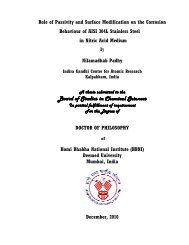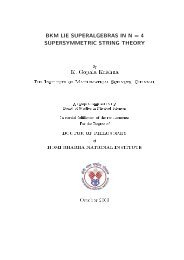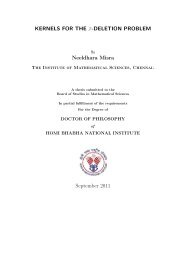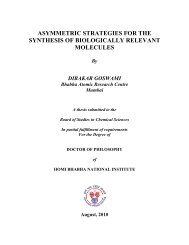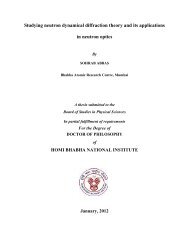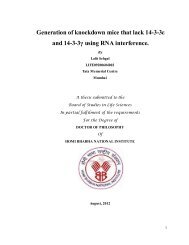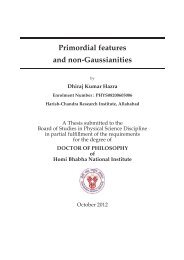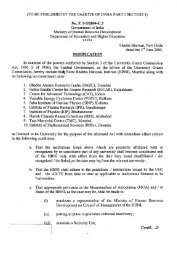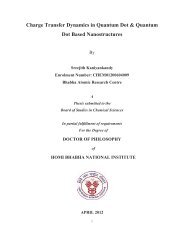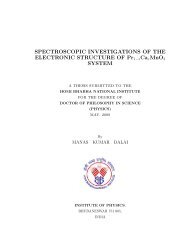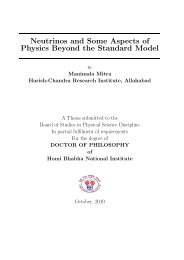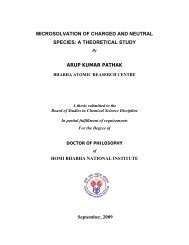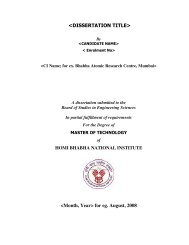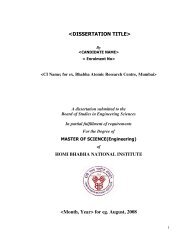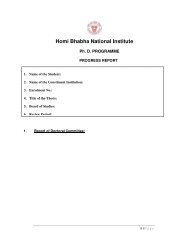LIFE09200604007 Tabish - Homi Bhabha National Institute
LIFE09200604007 Tabish - Homi Bhabha National Institute
LIFE09200604007 Tabish - Homi Bhabha National Institute
Create successful ePaper yourself
Turn your PDF publications into a flip-book with our unique Google optimized e-Paper software.
Review of Literature<br />
MPO gene polymorphism is shown to slightly modify the risk of oral cavity cancer<br />
development 161, 162 .<br />
NAT2 (N-acetyltransferase 2)<br />
This gene encodes an enzyme that transfers acetyl group from acetyl<br />
coenzyme-A to the N-terminal group of carcinogenic compounds. It functions to both<br />
activate and deactivate aryl-amine, hydrazine drugs and carcinogens. Polymorphisms in<br />
this gene are associated with higher incidences of cancer and drug toxicity. There are<br />
three polymorphic sites in NAT2 gene that are very frequently reported and are found<br />
to be associated with conferring risk to cancer viz., NAT2-exon2 Ile 114 Thr, NAT2-<br />
exon2 Arg 197 Gln and NAT2-exon2 Gly 286 Glu. The NAT gene polymorphisms are<br />
associated with increased risk of oral and pharyngeal squamous cell carcinoma 163, 164 .<br />
These polymorphisms have been implicated as risk in case control study of oral and<br />
oropharyngeal cancer in whites 162 . These polymorphisms along with cigarette smoking<br />
and alcohol consumption confer oral squamous cell cancer risk 165 , A meta-analysis<br />
showed NAT2 slow acetylation may contribute to a risk factor for laryngeal cancer in<br />
Asians 166 . NAT2 polymorphism is also associated with development of second primary<br />
cancer in head and neck cancer individual 10 . Slow NAT2 activity is a risk factor<br />
possibly leading to the development of head and neck cancer in response to tobacco<br />
carcinogens 167 .<br />
EPHX1 (mEH, Microsomal epoxide hydrolase)<br />
This gene encodes a carcinogen metabolizing enzyme mEH (microsomal<br />
epoxide hydrolase) that converts epoxides from the degradation of aromatic compounds<br />
to trans-dihydrodiols which can be conjugated and excreted from the body. mEH-exon3<br />
Try 113 His polymorphism was selected for present study as increased risk for head and<br />
neck cancer is associated with EPHX1-exon3 Tyr/His 113 and His/His 113 genotypes 141,<br />
168 . In a recent comprehensive meta-analysis of 84 studies, EPHX1 enzyme activity is<br />
related with risk of lung and upper aerodigestive tract cancers. It is described that low<br />
EPHX1 enzyme activity may have a potential protective effect on tobacco-related<br />
carcinogenesis of lung and UADT cancers, whereas high EPHX1 activity may have a<br />
harmful effect 169 .<br />
49



